The U.S. Navy Aviation Officer Candidate School (AOCS) came into being in the mid-1950s at NAS Pensacola, FL and lasted until about 2005, when the Base Realignment and Closure (BRAC) Commission decided to combine AOCS with the other Navy OCS at Newport, RI. To say that it was the end of an era is a mighty understatement. AOCS took young college graduates, transformed them into Naval Officers and most importantly Naval Aviators, focused their initial training on paying attention to detail in a pressure filled environment, and taught them the basics of flight aerodynamics all the while enforcing rigorous and continuous physical fitness challenges. I found an apt description in a document published by the staff of Naval Aviation News
Every student who pursues the golden wings of Naval Aviation enters the gates of the training command with fair measures of trepidation and joyful anticipation. Fear of failure runs in tandem with visions of adventure ahead. There is virtually no way to avoid an encounter with these emotions. Even the most stout of heart or those with lots of flight time beforehand get caught up in them.
Whatever an individual’s attributes—and they must be substantial, indeed, to even qualify of the pursuit—learning to fly the Navy way constitutes an endeavor equivalent to winning the spouse of one’s dreams or to facing a once-in-a-lifetime challenge on a grand scale.
There was a fair amount of brainwashing that went on at AOCS. We were constantly told that we’re training to be the best. We were a cut above, the most capable and lethal force in the military with an ability that is second to none. You’ve probably seen the stereotypes. Maybe you’ve seen the movies “Top Gun” or “Flight of the Intruder” which provided a bit of a window into the confidence and swagger required. Or maybe you’ve seen “An Officer and a Gentleman” which gave a glimpse of some of what went on at AOCS. Those aren’t totally true to the environment, but there is some glimmer of accuracy. To be the best you have to think you’re the best. And they do a good job of constantly reinforcing that idea. But not yet. First they had to break you down to basics and build you back up. It’s was a deliberate road to get there. And it’s strewn with minefields that might cause the bubble to burst at any time.
Since General Washington commanded the Continental Army there have been over 40 million Americans who have answered the call and served in the nation’s military. I would venture to say that a large majority of them, who on their first night of embarking on a new military life, were experiencing feelings similar to mine on 16 July 1974. I wouldn’t call it terror, but the level of uncertainty of what would come next and questioning if I had what it takes were pervasive feelings.
The fourteen weeks of AOCS is very much like a pressure cooker. When I reported in July, 1974 that was literally true. The majority of the time I was there the temperatures were in the high 90’s and the humidity was unbearable. Combine this with constant running, exercising, moving and it’s exhausting. But I’m getting ahead of myself.
When I walked through that door at Battalion III, I was immediately inundated with sensory overload. We weren’t given a time to report so people filtered in all day and consequently it allowed for maximum attention to be paid to each individual as we arrived. The tormentors were Marine drill instructors, or DI’s for short. These were for the most part staff sergeants (SSGT) in the Marine Corps who had been through extensive training. They were experts at drill instruction, attention to detail, leadership development and an uncanny ability to mold young men into Naval officers. Most DI’s went to USMC boot camp at Paris Island, SC or San Diego, CA to train and mold young Marines. But there were a few that go to AOCS. It’s a high bar to get that assignment. These DI’s aren’t training 18 year old kids straight from high school. They were training college graduates who most likely are close to the same age as the DI’s. But trust me on this…they had a way to exert authority like no else I’ve ever seen.
The best term to describe how the program starts is pressure. Everything is condensed. Everything you do is not good enough. You had to relearn everything. A whole new vocabulary was learned. You didn’t walk anywhere…you ran. The first thing they did was break you down to basics. But passing several final tests was required first. That first week is called Indoc week. It is filled with getting done all the things required to transition to AOCS. While in Indoc, we were what is known as a “Poopie”. We were issued drab, green fatigues so that everyone looks alike, heads were shaved, and we were issued a silver helmet to wear everywhere which is oh so attractive. A fair amount of time is spent at the Naval Aviation Medical Institute (NAMI). Of course, we had to run there and back. While there I was poked, prodded and given extensive testing to ensure I was physically qualified. The most worrisome thing was vision. 20/20 vision was absolutely required. No exceptions. Of course, I had gone through a strong battery of tests prior to joining, but these tests were all the same and more. It was surprising to me that a fair number of guys were determined to be not physically qualified (NPQed) for one reason or another. The most common was color blindness. I would have thought that they would have discovered that prior to getting to Pensacola.
During that first week the DI that looked after us was a gruff but somewhat kindly Gunnery Sergeant…the Gunny. Many of us started to think this whole experience wasn’t going to be too bad. And he seemed to calm down as the week wore on. On the last day of indoc week we were issued all the uniforms and equipment we would need as AOC Candidates. Khakis, whites, shoes, hats, belts, brass works, underwear…everything. It was all loaded into a giant sea bag and we started the walk to our ultimate home at the other end of the building. After dropping our stuff in assigned rooms we were told to go to a classroom on the first deck. Not the first floor, the first deck. That’s what floors are called in the Navy. Just one example of a new vernacular we all had to learn. Like beds. Beds are racks. We all assembled and wondered what was next. The Gunny told us he’d be leaving us and we were going to meet our permanent DI. There was a big accordion door at the end of the classroom and all of a sudden it parted and standing there was SSGT Penn, who was glaring at us and said in a loud and commanding voice….”FINALLY”. I will never forget that moment. We were now his. As he started to lay down the law to us, one very important thing he made clear was that we could quit at any time. It was called Drop On Request or DOR. At any time if we didn’t want to be there, or it was too hard, or we were physically beat all we had to do was say we wanted to DOR. No questions would be asked, we would be removed from the group and never seen again. The idea that we could easily walk away from all this made it that much harder. I won’t lie and say I never thought of DORing. But it was tempting. After only a few days it seemed that your mind started playing tricks on you and you started to wonder if you could maintain the pace. If you could measure up. But the fundamental reason I would not DOR was Patty’s confidence in me. Here she was having a baby all alone in a strange place and when we talked all she ever did was tell me she knew I could do it and she had confidence in me. I never really came close, but it was always there. I don’t how many we started with but we finished with 33 members of Class 29-74. I suspect our attrition was about 25%.
SSGT Penn was the star of this little training film called, “Pressure Point” which was made shortly after my class graduated. Take about 10 minutes to check it out and you’ll get a feeling for AOCS.
The first thing we had to do was get our rooms squared away. I had 3 roommates….Bob, Alan and Dan. These guys would become like brothers over the course of the next few months. I can’t tell you how many times I have run into them over the subsequent years and it’s like no time at all had passed. We had to learn how to precisely fold our cloths for placement in our lockers, make our racks, shine our shoes, polish our brass, ensure the room was spotlessly clean and on and on and on. Over the course of the next few months we had countless room, locker and personnel (RLP) inspections. All four of us would be standing at attention awaiting the inspecting party. Dan was prior enlisted in the Marine Corps so he was a particularly juicy target for harassment from the DI’s. But they always gave all of us plenty of attention. These inspections were an opportunity for the DI’s to reinforce the idea of teamwork. If one of us was deficient, we were all deficient. Teamwork and assuming responsibility for your shipmates (another new term) was all important. More than once one rack had a wrinkle or a sloppy corner and all four racks were overturned. Or one of us had something not folded perfectly and all of us had clothes thrown all around the room. Or shoes. Don’t get me started on shoes. They had to be perfect.
Everything was based on one principle. Attention to detail. That mantra was repeated over and over and over. The idea is that when the cockpit becomes our environment we better be aware of the everything around us and not miss a single thing. The other thing they constantly reinforced and not so much overtly but through action was the need to learn time and resource management. There are only so many hours in the day so you’d better prioritize to get things done…just like in the cockpit if things are going down sideways. After a while you become aware that the vast majority of challenges thrown at you can be accomplished, but it is the time element allowed to complete the task satisfactorily that is the challenge.
We quickly settled into a routine. Up at 5:00 am. Assembled in front of the building in PT gear at 5:15 am. PT and a run until 6:30 am. The days were filled with classroom instruction on multiple subjects like aerodynamics, power plants and engineering, navigation, Naval history, military bearing, military etiquette, and many more. Add to that marching, PT at any time, swim instruction and testing, more marching, room and personal maintenance and inspections, running the obstacle course, more medical tests, more marching with rifles, running the cross country course, three meals a day, and so many others and you get the idea. By the time lights out came at 10:00 pm sleep was welcomed. Only no one wanted to unmake a perfectly made rack and mess it up so most people slept on top of the sheets. It was so hot anyway that covers didn’t matter. The buildings at AOCS weren’t air conditioned so it was stifling most of the time. The DI’s used that to their advantage in breaking us down. I don’t know how many times someone screwed up and the entire class was in the passageway (I used to call it a hallway) and performing exercises (PT). It usually went on until the DI tired of it but always went long enough of the walls to start to sweat. There was always a strong aroma in the building. A few weeks under the tutelage of SSGT Penn, he showed up with another DI, SSGT Marsden in tow. He told us that Marsden was taking over the class. I never knew why but the first thought in all our minds was that maybe Marsden wouldn’t be so bad. Ha! He was as expert at torture and tormenting as Penn! Nothing changed. About this time I had some weird reaction to the laundry or the starch or something in the uniforms when they came back from the laundry. I had a big, red, itchy rash breakout all over me. I was trying to hide it but it was pretty obvious. They sent me to sick bay (the clinic in civilian terms) and got some ointment that cleared it up after a while. Turns out it wasn’t such an unusual affliction. But it certainly didn’t help my misery.
I had been talking to Patty every time I had a chance. There were a few phones in the entry to the barracks and we took turns in the evening “phoning home” for a few minutes. It was really sort of excruciating. I missed her a lot and I know she missed me. Her mom had arrived safely and they were planning for the birth of our child. On July 31 after lunch I was called into the DI’s office. That’s not an invitation that anyone wants. By that time my uniform was looking okay and I had learned how to enter an office. Yes, you have to relearn that also. It took a couple of tries and a fair amount of pushups, but I finally found myself in front of the SSGT Penn at his desk. He informed me that my son had been born earlier that day and both he and Patty were doing fine. I would normally have been pretty emotional over this event, but honestly I felt numb. Numb with where I was. Numb that I couldn’t see them. Numb that I wasn’t a part of it. Numb that I didn’t know when I’d see them. And then…a little bit of humanity snuck in. SSGT Penn handed me a special request chit and told me to fill it out requesting time off on the weekend to see Patty and our son, Chris. I was given from Saturday afternoon at 4:00 pm to Sunday afternoon at 4:00 pm to leave the base. Now, that was unheard of. To let a raw candidate out so soon was not something that was ever done. And I had to go through my own little hell of a personnel inspection before they would let me go. But that Saturday Patty’s mom picked me up and off we went. It was a whirlwind visit and I don’t even remember much of it except how great it was to see them and marvel in our new son. And 4:00 pm Sunday came too soon. Here I am during that visit. I look a little demonic and Chris is oblivious. And these were obviously the days before iPhones.
But the good news is that my class was due to get our “tapes” in a few weeks. Getting tapes was a big deal. The way it worked was that if your class had progressed satisfactorily, if we didn’t screw up too much, if we looked reasonably presentable to the public, we would get little colored tapes afixed to our name tags. That meant we were cleared to leave the Battalion area, cleared to go to the Aviation Officer Candidate Club which was a bar on the base (not be confused with the famed Mustin Beach Officers Club which an AOC wouldn’t be caught dead in), and cleared to leave the base overnight on Saturday. It was a big, big deal.
Most of the guys (and it was all guys in 1974) weren’t married. That made life so much simpler for them. They didn’t have to think or care about a wife or family. So their priority with off time was the AOCS Club, a famed bar downtown called Trader Jons, or hanging out at the beach. The married guys mostly just wanted to go home and decompress. I was looking for any opportunity to see Patty and Chris as much as possible so I turned into a choir singer. I had sung in a school choir in junior high school but nothing since and didn’t remotely have a singing voice. But a kindly chaplain let it be known if any married guys wanted a few extra minutes to see and talk to their wives, they could join the choir, have their wives come to service on Sunday morning and have some time to connect. I guess that’s one way to build the congregation!
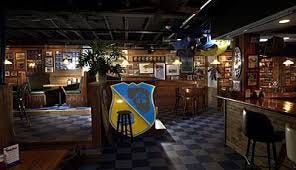
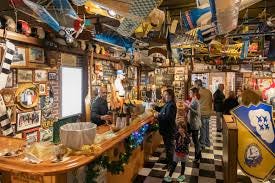
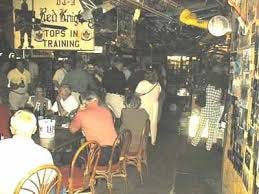
At some point we were issued rifles. I don’t even really remember what kind but I seem to remember that they were old M-1s. Maybe they were M-14s. I just don’t remember. In any case we never shot them but we cleaned them again and again, could strip them down and put them back together blindfolded, and carried them on the parade ground for countless hours. Doing the Manual of Arms became second nature. We weren’t as good as a crackerjack Marine Corps outfit, but we weren’t bad. The thing I really remember was that we were admonished that we had to protect our rifles. We were never to leave it unattended or lose track of it. More attention to detail training. I will never forget one day when we returned to our rooms and a classmate had left his locker unlocked. All of his gear in the locker was scattered around the room. But most ominously his rifle was missing. So the first thing that happened is that the whole class spent a long, excruciating time in the passageway doing PT. I don’t think I’ve ever sweat so much. But the horrible thing for him was he had to retrieve his rifle. SSGT Marsden told him that it was disassembled and parts were given to various DIs in the three battalions, and he had to go see them, one by one, to get the parts back. Misery!!! I’m sure he lost weight doing the PT required as payment to get the parts back. Another thing about rifles is that we got to run with them. It might sound like no big deal but trust me after a couple miles in the Florida heat it seemed like that damn rifle weighed 50 pounds. That was true especially if along the way we did rifle pushups over our heads. No one liked that little torture.
A big part of AOCS is swim training and swim challenges. We spent quite a lot of time in the pool being trained and evaluated by naval air crewmen. They were experts at what they did and the training was superb. We had to demonstrate competence and pass tests in the freestyle, backstroke and breaststroke which wasn’t a problem. We had to swim a mile fully clothed which wasn’t much of a problem. We had to tread water with our forefingers sticking out of the water for 2 minutes and then transition to a standard tread for I think about 15 minutes…fully clothed. We had to go through the Dilbert Dunker, which simulated an aircraft crashing in the water. And we had to jump off a 10 meter platform. I made it through all that no problem.
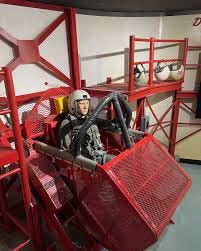
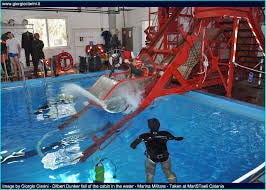
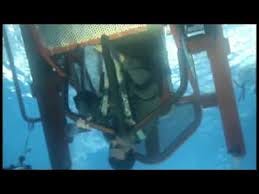
Many quotes are attributed to the generally agreed father of the U.S. Navy, John Paul Jones. This one was appropriate to think about as our training matured.
“It is by no means enough that an officer should be capable. . . . He should be as well a gentleman of liberal education, refined manners, punctilious courtesy, and the nicest sense of personal honor. . . . No meritorious act of a subordinate should escape his attention, even if the reward be only one word of approval. Conversely, he should not be blind to a single fault in any subordinate.”
At some point we got pretty extensive training in etiquette. After all, we would be dining in wardrooms on U.S. Navy ships, a place that drips with tradition and formality. We would be going to a fair share of formal dinners and needed to know how to act. I’m not sure it took in a lot of cases, or maybe it was forgotten, but they tried. Another thing they did was arrange for dances and receptions as part of our training. In this area “An Officer and a Gentleman” isn’t way off base. There were a lot of single women in the Pensacola area and they were routinely invited to these events. Some of the single guys dreaded them, some looked forward to them. The married guys were expected to attend also as at that time there was an expectation that the wife needed training. My how times have changed. But back in the day this training was useful when we got to the fleet and experienced some of the formality involved with being a Naval Officer. More on that in a future post!
Everyone had various difficulties and challenges in AOCS. I had two pretty major things. One could have bilged me out and one could have changed the course of my career. In my last post I talked about my broken arm and that the recruiter had me do pushups in his office to verify that it was okay. But what he didn’t know is that it really hindered me in doing pull-ups. I had worked on pull-ups for months before starting AOCS but didn’t get much better. The requirement to graduate and be commissioned was to do 3 pull-ups. 3 stinking pull-ups! But I struggled mightily in getting that done. As we progressed through AOCS we had continuous PT testing to ensure we could pass the final test. I did fine in everything but the damn pull-ups. For guys who had a deficiency, they had what was called a sub-PT group that got special attention. Not fun. I went with the group earlier than the normal PT period and worked on pull-ups. SSGT Marsden, being the compassionate guy that he was, required me to divert to the pull-up bar outside the barracks and practice pull-ups every time we left or returned to the barracks. It was a bit humiliating but I knew everyone was pulling for me. And I wasn’t the only one with a deficiency. Some guys couldn’t pass the cross country course at first. Some had a problem with the obstacle course before they got the hang of it. And there were others. But the bane of my existence was pull-ups. But a funny thing happened on the way to success…I got better. I had a dogged determination to do those 3 damn pull-ups and with a lot of repetition and a kindly evaluator, I finally passed and was good to go. I don’t know that I’ve ever done a pull-up since then, but I passed and that was good enough.
The second thing that had the potential to have a big impact on me and my career was whether I became a pilot or Naval Flight Officer (NFO), a back-seater. Our class was split between pilots and NFO’s and both were a great way to go. But I signed up to be a pilot, specifically a helicopter pilot. In my last post I talked about failing one of the academic tests, retaking it 3 months later and passing. My recruiter told me he would send the updated info to Pensacola and I’d be good to go. Alas, that didn’t happen. So at some point early in training I realized it was up to me to get it changed. I had the documentation, I just didn’t have it in the record. But how to do that? I said previously that I used a special request chit to get permission to go home to see Patty and Chris. So I decided to use it again to ask for a review of my status. I was surprised that it was received positively. So the request made it up the chain of command very slowly with positive endorsement at every level until one day I found myself called to the office of the Commanding Officer of all of AOCS, Capt Loux. I was petrified entering his grand office but he couldn’t have been nicer. He asked me some background questions, wanted to know about Patty and Chris, and was a real gentleman. At some point he said he was going to call “the Bureau” and get this fixed. I didn’t know what the Bureau was but it turned out the be the Bureau of Naval Personnel in Washington, DC. And he meant he was going to do it right then. So he had is Yoeman (secretary in civilian terms) place the call and it came through while I was sitting there. Whoever was on the other end was respectful to the Captain and said he’d look into it so I felt pretty good. A few weeks later word came down that I would remain an NFO. There was not really an explanation but that’s the way it would be. I was pretty disappointed as was Patty. She knew how much I wanted to be a pilot. So she called her dad. He was a retired Commander and knew a ton of people. When he did a tour of duty in Vietnam a few years earlier, he was Flag Secretary to Admiral Zumwalt, head of all U.S. Naval Forces in Vietnam. In that position my father-in-law knew a lot of flag officers. He told her he’d see what he could do. So there was nothing to do but keep going. I finished the AOCS portion prior to reporting for flight training and joined all the NFO’s in their curriculum. But…I literally got a last minute reprieve. On my first day of NFO training I was informed that I was to report to pilot training at NAF Saufley Field. The relief was enormous. For both myself and Patty. My father-in-law later told me that he had reached out to a flag officer he knew who was in charge of all Naval Aviation training and asked him to intervene. It was right then that I realized that in the Navy relationships, personal contact, asking for help, and luck had a lot to do with success. But whatever it was I was ecstatic to finally be in pilot training.
Another thing that we hadn’t thought about but was vitally important was the relationship developed between the wives. Most of them were all alone in a strange environment with no friends. But most made strong bonds with other wives and it made a difference. My roommate Bob’s wife, Christine had their daughter, Heather on September 16 and we were all fast friends. In fact we had a relationship for several years and even though we’ve all been through many changes, that bond is a lifelong one.
So finally we came to the end of our time at Battalion III, Aviation Officer Candidate School. But it wasn’t over yet. Not nearly. I’ve already told you that I was a few days late joining my pilot shipmates at NAF Saufley field, which is on the outskirts of Pensacola and now closed, to start primary pilot training. At that time Saufley was one of the busiest airports in the U.S. They had four runways which were always busy. But it was okay and I caught up quickly. The great news is that we were out of the barracks. We were assigned to rooms at the BOQ at Saufley and treated almost like adults. Even those of who were married had to stay in the BOQ but I will admit to heading home more than once when not authorized. But not too much because the training took up a lot of time. We still started the day with PT but weren’t being abused by the DI’s. And then it was on to a full day of instruction, both on the ground and in the air. At the end of about 5 weeks and assuming we successfully soloed, we’d be commissioned. But there was still a long way to go.
We would be training in the venerable T-34B Mentor, the standard primary flight trainer. It is a dual seat, single engine, basic aircraft. It was a very forgiving and easy to fly airplane. However, when you are new with no exposure to flying, it can be formidable. Remember this was back in the day when the fundamentals of flight training were very different and in truth, antiquated. There were no fancy simulators. Our only trainer was an old cockpit we could sit in and practice procedures. Memorization was the key to success. We had a flight manual and innumerable procedure sheets that included everything from start up to shut down that had to be memorized. The cadre of flight instructors were from the fleet and seemed like Gods to us. They had been there, done that. If I remember right, and a lot of it is a dim memory, we had some instructional manuals and a fair amount of classroom instruction, but the real training occurred with our shipmates as we went about practicing preflights, studying course rules, trying to understand aerodynamics and learning everything there was to know about the T-34B. One of the antiquated techniques they used to ensure we knew the procedures cold was reciting those procedures. Every day instructors were assigned to a big room in one of the buildings where flight students went to recite procedures to them. Once you thought you knew the procedure inside and out, you could go to the room and be assigned an instructor, sit down and recite the procedure. If successful, you would be signed off to go to the next procedure. Like I said, antiquated.
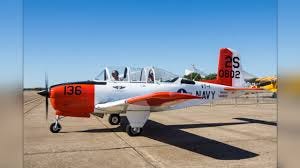
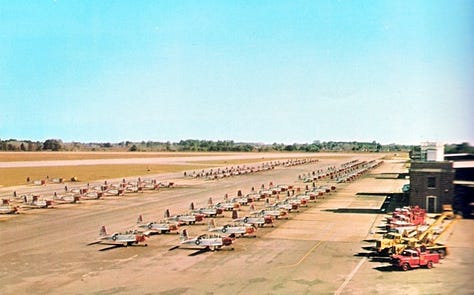
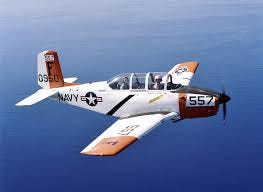
At some point I was deemed ready to start flying. I still remember the briefing (which was totally new to me), putting all the gear on, walking out to the flight line, preflighting the aircraft and taking off. It was exhilerating! And I felt like I was born to do this! Some guys remember every moment of this time but I don’t. It’s all a blur. But I do remember loving every minute of it. One thing I do know is that everyone was concerned about making it. You were graded on every flight. And not on just one thing. Procedures, navigation, headwork, technique and others made up the grade. The thing you absolutely didn’t want was a “down”. That meant a failed flight and potentially going home. I was fortunate to never have a down, but it always loomed. I knew some guys who had one and had to go to an evaluation board. Most of them returned. If you got two downs, you were pretty much doomed. So every flight was a sweat. And you wanted to be max prepared for every flight.
Five weeks flew by and two big, momentous events were on the horizon. The first was my first solo flight. I wish I could say it was something to remember, but really it was just another flight. My instructor and I conducted the flight normally. We did a whole bunch of practice maneuvering at altitude and then it was time for landing practice. We went to one of the several outlying fields in the Northern Florida area and entered the pattern. After a couple touch and gos the instructor told me to call for a full stop. I did and after landing we taxied off the runway. He told he to stop, he hopped out and told me to do 4 or 5 touch and gos and not to forget him before heading home. And that was it. I had soloed and in a week or two would be commissioned as an Ensign in the U.S. Navy.
The only thing left was to find out whether I’d be flying jets, props or helicopters. I think I was more nervous about that than soloing. As I have said all along, I wanted helicopters. But there was a twist. The Navy makes assignments based on needs of the Navy and then, secondarily, wishes of the individual. I had done very well in primary flight training and had what they called “jet grades”. As the date to submit my preferences arrived my primary flight instructor and I had some long, serious heart to heart talks. He was a jet pilot and lobbied pretty hard. He gave me every reason in the book to choose jets. And he told me I might not have a choice because with the grades I had, I might just be assigned to jets regardless of my wishes. But I was stubborn. I had wanted to fly helicopters since I was 10 years old and wasn’t going to change my mind. Luckily, the week my name went in for assignment, there were openings in all three communities and I had no problem getting helicopters. The truth is that any of them would have worked out, but I was very happy to get to fly the aircraft of my dreams. Here’s my solo photo. Notice that the hair had started to return.
After that my class reconvened over at NAS Pensacola for the parade and commissioning ceremony. It was pomp and circumstance like you expect from the military. Patty and Chris were there and I was beaming in my service dress blues and my brand new Ensign stripe. I had never worked so hard to achieve something in my life and I knew I could never had done it without my wife at my side. Here we are at commissioning with Captain Loux. Couldn’t have been prouder.
And I had never forged stronger bonds with a group of guys in my life. I would walk through fire for them and they’d do the same for me. Here we are. The final 33 in class 29-74. I’m fourth from the left on the top. By the way, Patty made the flags. How cool is that?
After the commissioning we had the traditional ceremony where we got our first salute as an officer from an enlisted man and that man was SSGT Marsden. After the salute we each gave him a silver dollar. As you would imagine my views of my DI had moderated considerably. Far from being the crazy tyrant hell bent on torturing us, everything had come into perspective. The job he and all the DI’s did to mold us into the unit, the officers and the men we were was really sort of mind boggling. In the course of 14 weeks we had come from a ragtag bunch of civilians to a military unit that not only made it through but had soloed in a military aircraft. Most of us had never even been up close to a military aircraft. We had a fantastic graduation party that night but once again the memory is dim. I’m not sure if time or alcohol was the culprit.
Next it was on to a full year of flight school. It won’t prove to be easy. But that is another story.

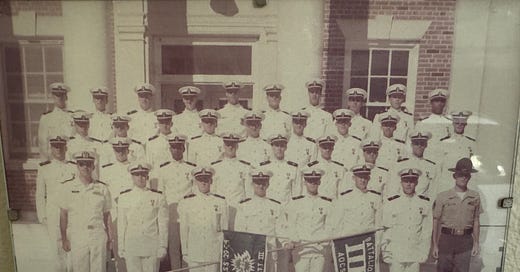


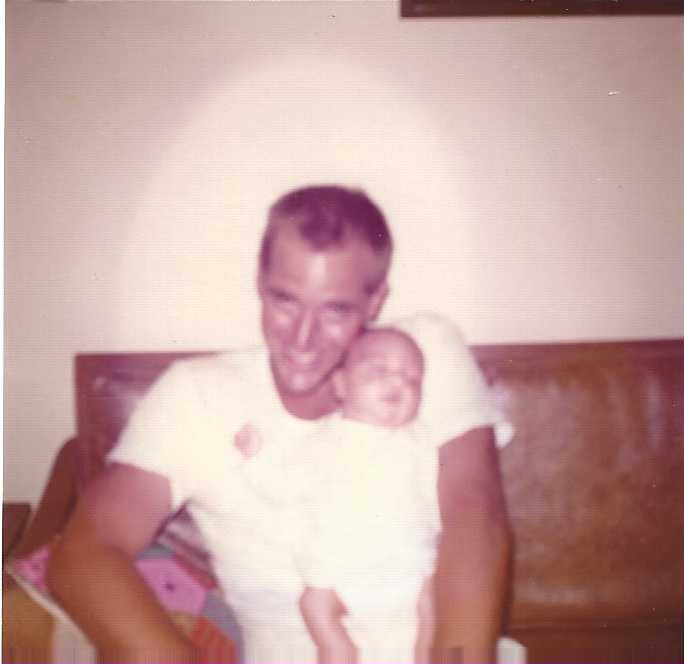
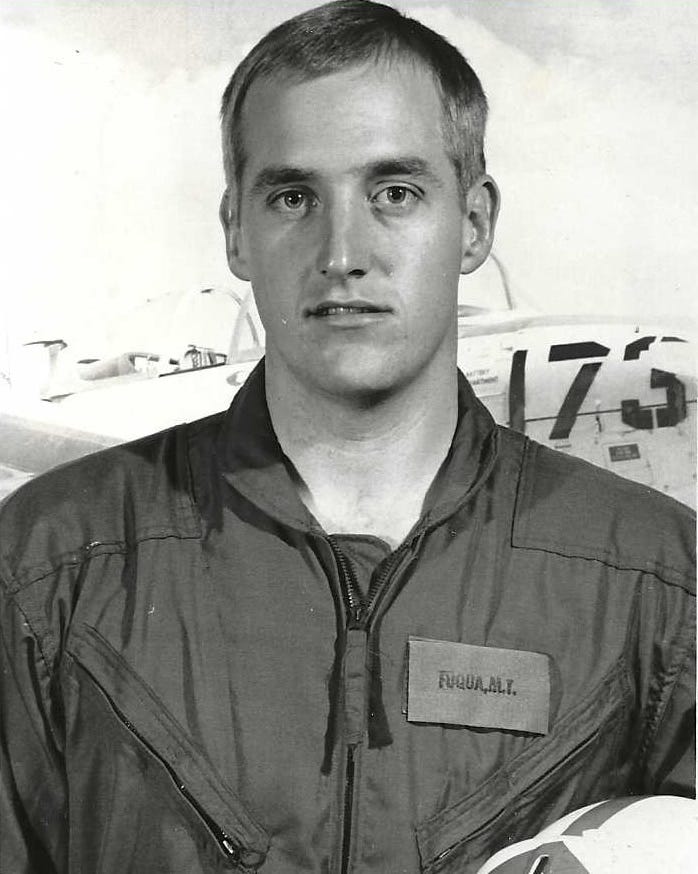
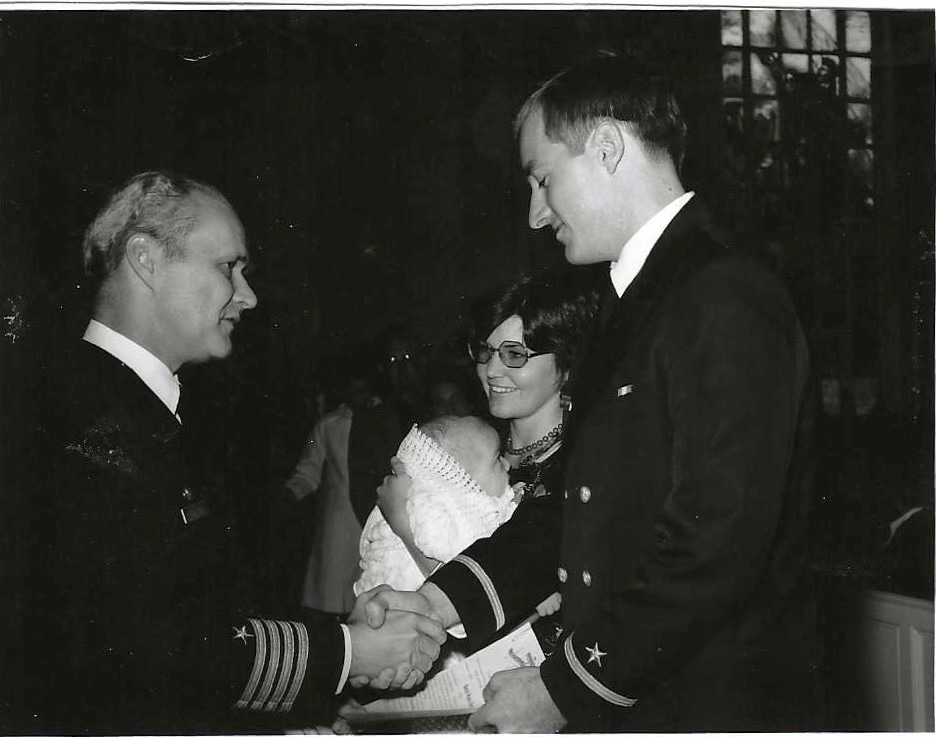

Nice walk down memory lane....Mine was different because I was an AVROC and my AOCS was split into two 6 week summers - before I had graduated. My first day in INDOC battalion (it was a separate building located away from the other battalions) was the day Bobby Kennedy got shot. June 5, 1968. We learned about it at 5:15 before our run to chow. I was a rising Junior in college. That was also the year MLK jr had been killed, there were campus riots, and now Kennedy was dead while a bunch of people who I didn't know or like were yelling at me 24/7. It was surreal given the circumstances.
And by the way, you don't know what kind of rifle you had?? Let me refresh your memory. It was a "9.4 lb, gas operated, clip-fed, semi automatic shoulder weapon, Maggot!" (An M-1.)
Two "great" summers. And when I graduated from college the following year I received my commission (on USS Constitution in Boston). THEN it was off to flight school .... What a great life!
Mike !!! Greetings and thanks David Kriegel class 29-74 great write up !!! You ranked from memory very high in our graduating class Question Did we have any DOR's ? I got my wings Dec 1975 made a 20 year career